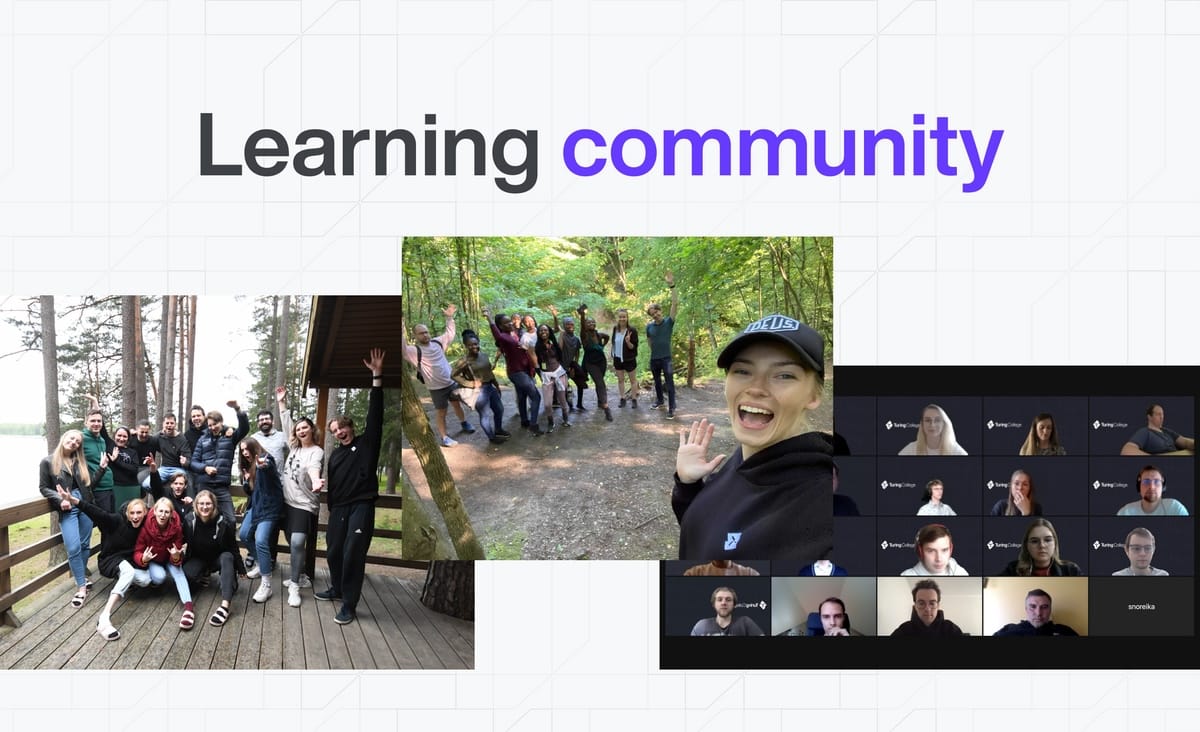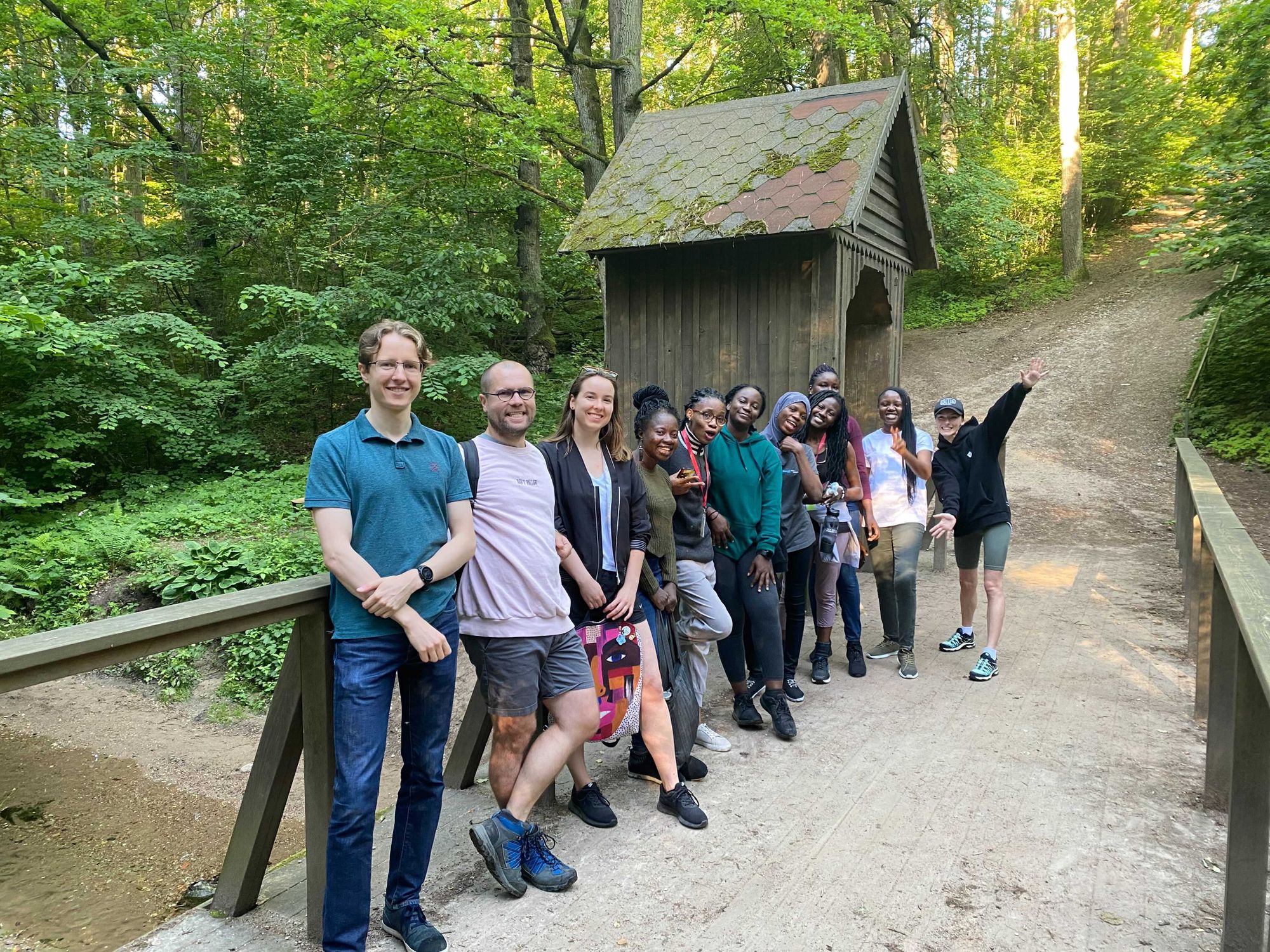How do you create a data science learning community?

Community matters when it comes to successful data science studies. In fact, it matters a lot.
Self study can be a hard slog, with motivation a real issue. And courses at universities and bootcamps often leave you with little guidance as to how to develop your career and improve your skill set.
But, as we discussed in our recent blog on why community matters so much, being part of a tight-knit group of learners and professionals brings big benefits:
- You get support and encouragement when you hit a rough patch in the course (there's bound to be at least one),
- You get different perspectives on how to solve a problem, and helpful tips and advice that increase your chances of success,
- You get to develop the soft skills that you'll use in your data science career (skills like effective communication and teamwork).
Our Community Team share their insights
So we caught up once more with 4 people who have all made big contributions to developing and bringing together the Turing College community:
- Career Development Coordinator Toufic Khoriaty,
- Project Manager Jurgita Tamolytė,
- Head of People & Events Algė Masiulytė,
- and Chief Community Officer Edita Dudulienė.
They shared their insights on how to build and maintain a supportive, tight-knit community that leads to success in data science studies.
In this article we'll take a look at 4 key points they highlight:
- Establishing the right culture,
- Structuring everyday learning,
- Organising inspiring events,
- And creating a discord channel to bring everyone together.
The right culture is the foundation for a data science learning community
"We encourage a culture of asking for and receiving help, and also of providing help," explains Edita.
In too many learning environments, students are reluctant to ask for help. Or sometimes they put pressure on themselves to figure everything out individually.
But the whole purpose of Turing College is to recreate the real world of work. And in real IT and data science teams, people ask for help all the time. It's not a sign of weakness, it's a sign of strength that you are ready to learn and improve.
Similarly, in real work environments colleagues are expected to provide help to others. It's natural that within a team some are stronger than others in certain areas. But those strong performers have a responsibility to help. Not only does this strengthen their own skills (teaching others is proven to be one of the single most effective ways to learn a subject), it creates an environment where people cooperate and support each other.
Ultimately, as Algė points out, the goal is to:
"help our learners build positive and respectful relationships, and create a feeling of belonging."
Creating a culture based on help (whether it is giving or receiving) is a key way to achieve this.
Everyday learning activities strength the community
"A typical week for a learner at Turing College looks pretty much the same as in an IT company," Edita explains. "There are regular Scrum meetings (such as standups and retrospectives), and one-to-one sessions with our Personal Development Coordinator or Batch managers."
During these one-to-one sessions, learners are encouraged to be as open as possible about how they are feeling. "We talk with them in a simple, honest way about anything and everything that they want to discuss," says Jurgita.
There is also daily peer-to-peer learning, where participants evaluate one another's work and give suggestions and guidance. As Edita points out, "these sessions encourage close communication and collaboration with other learners." And every other week learners have coffee buddy calls to catch up with their fellow students.
The regularity of this contact is one of the key reasons why the Turing College community is so tight-knit. As learners, mentors, team leads and staff become more familiar with each other, strong bonds develop and there is more trust.
These are the perfect conditions for learners to improve and grow. As Jurgita states, "ultimately, every day is dedicated to personal growth, just in very different and diverse ways."
Inspiring events bring the whole community together
While everyday events create thousands of community-building micro-interactions, you also need events that unify the whole community. They create esprit de corps and give the community a sense of overall purpose.
Events also add an additional and crucial element to the learning experience. And this element is present from day one of the Turing College experience.
"Our learners Kick off their studies at Turing College with Intro Week," explains Algė. "During this 4 day-long event, we cover the most significant topics that learners need to know before starting their journey here."
From then on, there are regular events and workshops bringing everyone together. "We provide bi-weekly workshops related to soft-skills development, zoom meetings with our hiring partners, and other initiatives all happening in parallel with the everyday learning activities," says Edita.
There are also regular informal get-togethers (all online at the moment, but soon to be in person we hope).
According to Algė, these events build learners' soft skills and introduce them to our Hiring Partners. But, just as importantly, they "create connections between learners." And it's these connections that create the supportive community here.

A space to interact on Discord
Communities thrive on connections. So, beyond the formal sessions and events that are part of the program, it's essential that there is a space where learners can just ask a question, start a discussion, or simply have a chat with some other members of the community.
At Turing College, that space is our Discord channel.
What's great about the channel is that it unites learners from every batch. This means that someone just getting started on the program like Linda ….
… can connect with seasoned veterans like Laurynas who are 7 months into their studies.
It's also an ideal place to ask questions. That's because, along with regular learners, you can connect with Junior Team Leads. These are more experienced learners within the community who can provide advice, share resources, or just give you some words of encouragement. People like Mantas.
If you're interested in studying with us, or you have already applied and want to find out more, our Discord channel is open to you too. It's the perfect place to ask a question and talk with people who are actually living the Turing College experience. You can access it here.
A community that enables better education
Turing College's Community Team have created a supportive, open environment thanks to the culture, activities and connections they have organised and established.
And according to Toufic, this sets Turing College apart from other learning institutions. "Our learners tell us that it is the sense of community that stands out. This is what makes Turing College special, somewhere different to other IT-related schools and bootcamps," he says.
"All in all, this community doesn't play a role in providing 'more' education, it simply enables 'better' education."
